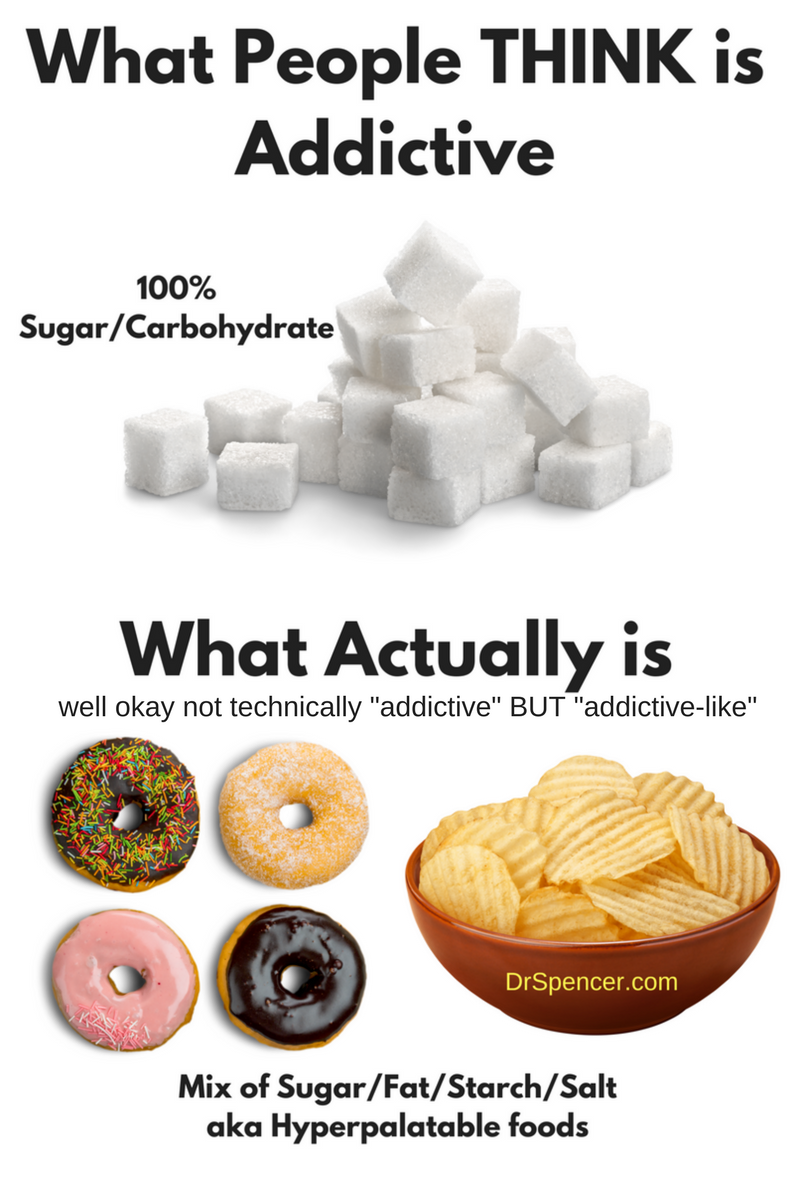
Something that has driven me nuts in the past is the notion that sugar is addictive and problematic by itself. People talk about sugar being evil, but when you ask them to list specific foods, they list foods that are high in both sugar AND fat (think donuts, cookies, cakes, and pies). So is it the sugar or the fat or both or neither? This type of black and white thinking is what gets us into trouble.
Think about it. Have you ever popped a sugar cube into your mouth and then wanted more? Compare that to a non-sugary food like a crunchy salty starchy delicious potato chip. If sugar is so “addictive,” then why would most people be driven to eat many more potato chips than sugar cubes? It’s because sugar is not the single problem.
There is a term thrown around in the nutrition and obesity research realm called “hyperpalatable foods.” Defined basically as foods that are super yummy and tasty that you might eat despite not being hungry.
These hyperpalatable foods are very easily overeaten and are thought to be a strong contributor to our world’s growing waistlines. There are even food scientists trying to make foods more and more palatable so that we eat more of them!
So what makes us want to eat more of these foods if it isn’t just sugar?
- Mix of sweet, starch, and fat. Compared to each individually, the right combination of these will push us to eat more. Think about fat-free cookies vs. regular cookies. Think about pasta without oil or butter etc.
- Mouth-feel. Compare the sugar cubes (rigid with well-defined corners) to glazed donuts (soft and moist on the outside). Simple taste isn’t the only thing that matters. How foods feel in our mouths makes us want to eat more or less.
- Salt. Salt doesn’t even have calories (let alone sugar), but the right amount will make us want to eat more of foods with it than without it.
- Consistency. Some of my patients refuse to eat things like greek yogurt, cottage cheese, and oatmeal due to consistency.
There is also something called “sensory-specific satiety” where we may not be fully satiated despite feeling full because we want something sweet (dessert) instead of savory (like our dinner). So when you’re full next time and then want a piece of pie despite bursting at the belt, think about that. The reward center in our brain is also involved involved in this process as well.
We throw around the term “addictive” when it comes to foods, which may be a slight misnomer, but if there are any foods that are at least “addictive-like” it would be these. What’s more is that those with excess weight may have struggles with stopping when eating these foods due to changes in their reward system in their brains compared to lean individuals.
A recent comprehensive review on whether sugar is “addictive” concludes that it is NOT. The review does conclude that high-fat savory and high-fat sweet foods are much more likely to be overeaten than mostly sugary sweet foods. “Overweight correlated only with addictive-like problems for high-fat savoury and high-fat sweet foods (P < 0.0001), while this was not found for foods mainly containing sugar.”
So what should you do?
- I would limit these types of foods in your diet IF you have struggles limiting. Get the stuff out of the house if possible. Ask coworkers not to bring in these foods to work etc. Easier said then done I know!
- Remember to ACCEPT that the fruit/vegetables/lean proteins are not as pleasurable as your go-to junk food.
- There is a medicine called Contrave that has a combination of bupropion and naltrexone. These medicines both work in the reward system in your brain to help with those craving and urges to grab these foods. Another medicine I use is called topiramate, which may have some benefit as well. This is something to discuss with your doctor potentially.
